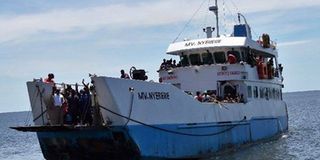Questions over ferry

What you need to know:
Even as the government ordered an investigation into the possible cause of the tragedy, MV Nyerere’s capsizing is a painful reminder of lurking death that is a constant fear confronting millions of citizens who rely on marine transport in their daily livelihoods.
Dar es Salaam. Thursday’s ferry accident in Ukerewe District that killed more than 130 people raises serious questions whether, as a country, we have learnt any lessons from similar past incidents.
Even as the government ordered an investigation into the possible cause of the tragedy, MV Nyerere’s capsizing is a painful reminder of lurking death that is a constant fear confronting millions of citizens who rely on marine transport in their daily livelihoods.
That the safety of people and vessels plying Tanzania’s expansive water bodies – from the ocean, lakes and rivers, remains a subject of grave concern that cannot be better demonstrated than by the latest disaster in Ukara.
Several witnesses say the incident, which has left the country reeling in shock, was likely due to overloading and a mad-rush of passengers to the disembarking area, causing the vessel to overturn.
Ultimately, investigations will reveal what went wrong in this incident, but it largely mirrors on the troubling safety record among regulatory authorities, including marine disaster management systems that remain wanting, if rescue efforts in Ukara is anything to go by.
Members of the public were furious on social media that lack of appropriate equipment led to the suspension of rescue efforts at nightfall on Thursday as hundreds of victims remained unaccounted for.
Questions were also being raised how the evidently overloaded ferry was allowed to sail with an estimated 400 passengers against its capacity of 100 people. The crew also had cargo above its limit.
Yesterday, President John Magufuli hinted to the possibility that the vessel was overloaded and may have been in the hands of inexperienced crew. Speaking at the scene of the tragedy, Prime Minister Kassim Majaliwa also noted MV Nyerere was recently fitted with new engines.
As the country embarks on four days of national mourning, not only answers will be awaited from Ukara, but authorities will once again need to seriously take self-assessment on their readiness to enforce safety regulations, including putting in place effective disaster response mechanism to prevent re-occurrence of similar disasters.
A trail of recommendations after past marine disasters on vessel inspection, lack of regular maintenance and repair; lack inadequate number of life jackets and lifeboats or even lack of firefighting equipment are matters that should be taken seriously.
Vunjo Member of Parliament James Mbatia who is a disaster management expert says it was sad authorities have not acted fast enough to fix loopholes that endanger the lives of marine transport users.
“It is shameful to suspend rescue operations because of darkness. We need to overhaul our systems and put in place comprehensive disaster response structures,” he said at a press conference.
He said despite laws requiring the establishment of a disaster management authority, little is seen towards this effort.
However, Sumatra Consumer Consultative Council (SCCC) consumer education officer Nicholas Kinyariri said the government made some institutional and legal reforms after the MV Bukoba accident.
“But, solutions used for mitigating challenges today will not necessarily be applied for challenges of tomorrow,” he told The Citizen.
Ukerewe lawmaker Joseph Mkundi (Chadema) said the most important question is when authorities will find lasting solutions to marine accidents.
“Though they maintained the ferry engines two months ago, no measures were taken to increase the number of trips between the two sides. to avoid cramming,” he said.




